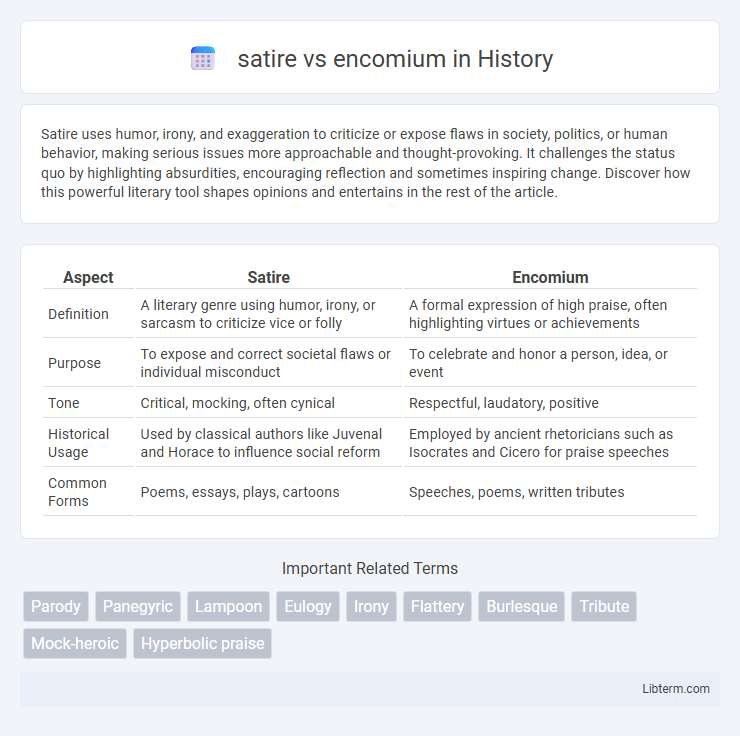Satire uses humor, irony, and exaggeration to criticize or expose flaws in society, politics, or human behavior, making serious issues more approachable and thought-provoking. It challenges the status quo by highlighting absurdities, encouraging reflection and sometimes inspiring change. Discover how this powerful literary tool shapes opinions and entertains in the rest of the article.
Table of Comparison
| Aspect | Satire | Encomium |
|---|---|---|
| Definition | A literary genre using humor, irony, or sarcasm to criticize vice or folly | A formal expression of high praise, often highlighting virtues or achievements |
| Purpose | To expose and correct societal flaws or individual misconduct | To celebrate and honor a person, idea, or event |
| Tone | Critical, mocking, often cynical | Respectful, laudatory, positive |
| Historical Usage | Used by classical authors like Juvenal and Horace to influence social reform | Employed by ancient rhetoricians such as Isocrates and Cicero for praise speeches |
| Common Forms | Poems, essays, plays, cartoons | Speeches, poems, written tributes |
Understanding Satire: Definition and Purpose
Satire is a literary genre that employs humor, irony, and exaggeration to criticize or expose human vices and societal flaws, aiming to provoke reflection and reform. Its purpose is to highlight absurdities and encourage change by ridiculing folly and corruption through witty and often biting commentary. Unlike encomium, which praises and extols qualities, satire seeks to undermine and question through clever, subversive techniques.
Encomium Explained: Meaning and Characteristics
Encomium is a formal expression of high praise often delivered in speeches or written texts to celebrate an individual's virtues or achievements. Characterized by encomiastic language, it employs elaborate and laudatory rhetoric designed to inspire admiration and honor the subject. Unlike satire, which uses irony and humor to criticize, encomium emphasizes positive qualities and fosters appreciation through sincere and elevated praise.
Historical Origins of Satire and Encomium
Satire originated in ancient Rome with writers like Horace and Juvenal, who used humor and irony to criticize social norms and political corruption. Encomium, tracing back to classical Greece, was employed by rhetoricians such as Isocrates and Aristotle to deliver formal praise and exalt virtues of individuals or entities. Both genres evolved as rhetorical tools serving contrasting functions: satire to provoke reflection and reform, encomium to celebrate and immortalize.
Literary Techniques in Satire vs. Encomium
Satire employs irony, sarcasm, and exaggeration as primary literary techniques to expose flaws and criticize societal issues through humor and ridicule. In contrast, encomium uses praise, exaltation, and hyperbole to celebrate and honor virtues or achievements in a positive and respectful tone. The strategic use of these contrasting techniques defines the distinct rhetorical purposes and emotional impacts of satire and encomium in literature.
Tone and Style: Contrasts Between Satire and Encomium
Satire employs a tone of irony, sarcasm, or ridicule to expose human flaws and societal vices, often using sharp wit and exaggerated scenarios to provoke critical reflection. Encomium adopts an earnest, laudatory tone that emphasizes praise and admiration, characterized by elegant, elevated language that highlights virtues and achievements. The stylistic contrast lies in satire's use of humor and cynicism to critique, whereas encomium relies on sincere, celebratory expression to honor its subject.
Notable Examples of Satirical Works
Jonathan Swift's *Gulliver's Travels* masterfully uses satire to critique human nature and society's follies, while George Orwell's *Animal Farm* employs allegorical satire to expose political corruption and totalitarianism. Voltaire's *Candide* sharply mocks philosophical optimism and blind faith through witty and ironic narrative. Jonathan Swift's iconic essay *A Modest Proposal* exemplifies biting satirical style by advocating absurd solutions to highlight social injustices and poverty in 18th-century Ireland.
Famous Encomiums in Literature and Rhetoric
Famous encomiums in literature and rhetoric celebrate individuals or virtues with high praise, exemplified by Aristotle's encomium of courage in "Nicomachean Ethics" and Cicero's laudatory speeches honoring statesmen like Julius Caesar. These rhetorical praises contrast with satire by elevating their subjects, crafting compelling tributes that reinforce societal values. Encomiums utilize vivid language and structured argumentation to inspire admiration and moral reflection among audiences.
Social Impact: Critique vs. Praise
Satire often drives social impact by employing humor, irony, and exaggeration to expose flaws, challenge norms, and provoke critical thinking, leading to societal reflection and potential reform. Encomium, through earnest praise and commendation, reinforces positive behaviors and ideals, fostering admiration and encouraging the continuation of valued traits or achievements. Both genres shape public sentiment by either critiquing faults or celebrating virtues, influencing cultural values and collective attitudes.
When to Use Satire or Encomium in Writing
Satire is effective in writing when the goal is to criticize or expose flaws, often using humor or irony to provoke thought and encourage change. Encomium suits situations where praising accomplishments, virtues, or qualities is needed to inspire admiration or convey respect. Choosing between satire and encomium depends on whether the intent is to highlight faults for reform or to celebrate and honor positive traits.
Satire and Encomium: Modern Applications and Relevance
Satire and encomium continue to shape modern discourse by critiquing societal flaws and celebrating achievements, respectively, in literature, media, and politics. Satire employs humor, irony, and exaggeration to expose corruption and prompt social change, evident in works like "The Onion" and Jonathan Swift's legacy. Encomium remains vital in public speaking and digital platforms, honoring individuals or ideas to inspire admiration and reinforce cultural values.
satire Infographic

 libterm.com
libterm.com